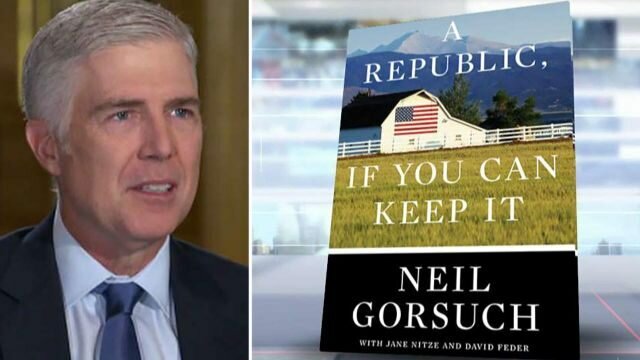If we are fortunate, the Civil War will be the last time we face destruction by a fire set with our own hands. The threat is now dry-rot, that spreads like a fungus from our lack of understanding of our nation’s fundamental principles, and the lack of communication skills needed to convey them to our fellow citizens. A Republic, If You Can Keep It by Supreme Court Associate Justice Neil Gorsuch is a plea on both counts.
There is some personal background, but Justice Gorsuch was fortunate enough to come from a solid middle class Colorado family, so there is little drama (unlike, I am quite sure, the next book I will read and review – Justice Clarence Thomas’s My Grandfather’s Son).The writing is lively; as in his recounting of a speech where he took on the dry subject of the “modern” rules of civil procedure – an “experiment” initiated in 1938 leading to the massive and justice-suffocating pretrial discovery:
“Now, that’s a pretty odd thing, when you think about it. Maybe the only thing that really sounds new or modern after seventy years is Keith Richards of the Rolling Stones. Some might say he looks like he’s done some experimenting too.”
The gravamen of the book can be summed up in some passages from The Federalist. Madison’s No. 47 warns us that:
“The accumulation of all powers, legislative, executive, and judiciary, in the same hands, whether of one, a few, or many, and whether hereditary, self-appointed, or elective, may justly be pronounced the very definition of tyranny.”
Look around – what do you see? Congress passing off legislative power to nameless, faceless, unaccountable bureaucrats whose printed indecipherable regulations kill more trees than actual laws passed; presidents of both parties issuing executive orders in lieu of congressional action; and judges whose view of a “living Constitution” allow them to enact their own preferences by fiat. Our Bill of Rights gets all the press, but separation of power is the foundation of our liberty.
While we are on the subject of bureaucratic regulation, look again to The Federalist – this time No. 62:
“The internal effects of a mutable policy are still more calamitous. It poisons the blessing of liberty itself. It will be of little avail to the people, that the laws are made by men of their own choice, if the laws be so voluminous that they cannot be read, or so incoherent that they cannot be understood; if they be repealed or revised before they are promulgated, or undergo such incessant changes that no man who knows what the law is today, can guess what it will be tomorrow. Law is defined to be a rule of action, but how can that be a rule, which is little known, and less fixed?”
Gorsuch points out that a noted law professor has in all seriousness claimed that it is now possible in this country to charge anyone over the age of 18 with a federal crime or misdemeanor. Have you tried to get a permit for anything lately?
As for civility, Justice Gorsuch takes as his guiding light an epitaph for a judge on an old gravestone in Boston’s historic Granary Burying Ground:
“As a lawyer, he was faithful and able; as a judge, patient, impartial, and decisive; as a chief magistrate, accessible, frank, and independent. In private life, he was affectionate and mild; in public life, he was dignified and firm. Party feuds were allayed by the correctness of his conduct; calumny was silenced by the weight of his virtues; and rancor softened by the amenity of his manners.”
Could use a little more of that ’round here, dontcha think?
Just before the shots “heard ’round the world” were fired at Lexington and Concord, Edmund Burke warned Parliament that among other attributes that make the Americans a force to be reckoned with was their intimacy with law, and their ability to make their case:
“In no country perhaps in the world is the law so general a study. The profession itself is numerous and powerful.. But all who read, and most do read, endeavor to obtain some smattering in that science.”
To make his point, Burke told them that Blackstone’s Commentaries sell in America almost as well as the King James Bible, and is read almost as often. (Did anyone notice that Alan Dershowitz waved about a dog-eared, ancient volume of Blackstone when he presented his arguments in the well of the Senate?) Thus, well-armed in both fact and law, Americans, he said, “…augur misgovernment at a distance, and snuff the approach of tyranny in every tainted breeze.” Have we now lost our sense of smell? Did you know that the Federalist papers cited above were written as off-the-cuff newspaper columns, designed to convince their fellow citizens to ratify the Constitution? Do we read and write such quality today?
The title of the book comes from what Benjamin Franklin is thought to have said to a woman who asked him what kind of government we will have, as he left the Constitutional Convention: “A republic, madam, if you can keep it.” My copy is inscribed “To David – Aim high! Neil Gorsuch.” Sound advice for us all. Let’s get to it.



Comments
2
Leave a Reply
If the book is as good as this review, it’s very good indeed. One of the problems we have today is that Americans are so ignorant of basic Civics, that one used to have to pass to graduate from high school. Thus, a well paid television reporter can muse about how gerrymandering might influence the composition of the United States Senate. Ignorant as a brick, as we say in this part of the country!
Thanks for the kind words, Robert. Yeah, kinda tough to gerrymander state lines. As for civics, there’s some hope. I heard about a introduction to American history from Hillsdale college called LAND OF HOPE. As an example of how it differs from the “politically correct” tomes, the reasons for the breakout of the American Revolution in Massachusetts are summed up in a paragraph, followed by a quote from an old militiaman who was asked decades later why he turned out on that long ago April morning. Was it the Stamp Act? The tea tax? No. “Young man,” he said, “what… Read more »